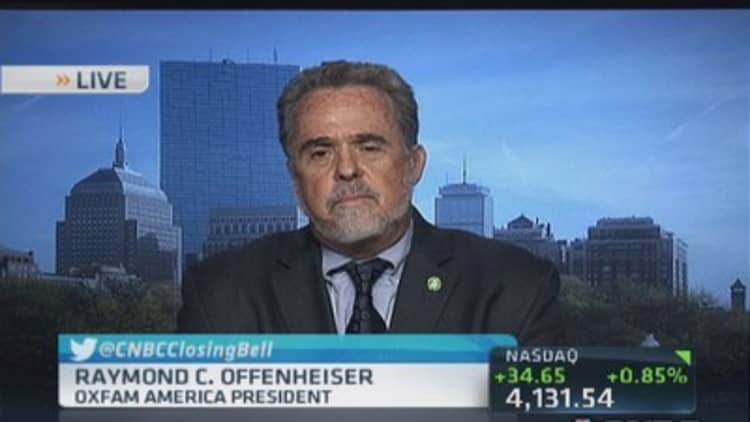Ignoring the effects of climate change will cost the U.S. economy billions of dollars, with a large part of that loss connected to farms that struggle to adapt and coastal lands flooded by the oceans, according to a report released this week.
The report, entitled "Risky Business," broadly addresses the risks climate change poses to the U.S. economy, and is endorsed by a bipartisan group of heavy hitters from the investing and business worlds. The report doesn't provide new climate change science. Instead, it delves into projected economic losses if no action is taken to stop greenhouse gas emissions.
"Not planning for climate change is very irrational," said Kate Gordon, executive director of the study and vice president of Next Generation, a think tank that promotes solutions to climate change. "We have to get people to really consider the economic risks of extreme weather."
Analysis for "Risky Business" was conducted by the economic research firm Rhodium Group and catastrophe modeling company Risk Management Solutions.
Read MoreWhy so many Americans don't care about the drought
But the public face of the report is a committee of business and political leaders. They include former Treasury Secretaries Hank Paulson and Richard Rubin, former New York City Mayor Michael Bloomberg, former Secretary of State George Shultz and former Secretary of Housing and Urban Development Henry Cisneros.
Also on the committee are former hedge fund executive Thomas Steyer and Gregory Page, who is chairman of the board for agribusiness giant Cargill.
Struggling farms, rising seas
Some counties in the Midwest and South will face a "significant" challenge adapting agriculturally to climate change over the next five to 25 years, the report said. Farmers in those counties could see a decline in yields of greater than 10 percent if they continue growing corn, wheat, soy and cotton, "with a 1-in-20 chance of yield losses of these crops of more than 20 percent," according to the report.
Under certain circumstances, warmer temperatures could actually increase crop yields in the Upper Great Plains states like Minnesota, as farmers there would likely grow more corn from the shifting weather patterns, the study said.
Read MoreDrought brings 'divine' intervention to find water
But crop yields in the Midwest, in states such as Missouri, could fall by 70 percent from scorching heat by the year 2099.
Higher sea levels and storm surges in the next 15 years will increase the cost of damages along the Eastern Seaboard and the Gulf of Mexico by $2 billion to $3.5 billion a year.
Nationwide, an estimated $106 billion worth of land could be below sea level by 2050. And the total economic loss from the land could be between $238 billion and $507 billion by the end of the century.
There are no specific policy proposals to deal with climate change in the report. Executive director Gordon said the lack of proposals was meant to avoid a political fight over the issue. Instead, the survey was geared to start a discussion about the economic risks involved with climate change.
"The important thing to remember is that something can be done to reduce the impact of greenhouse emissions," she argued.

The "Risky Business" committee is just beginning its work, Gordon said, noting that members have been on Capitol Hill and at the White House this week. She said they also want to reach out to various business leaders across the country.
Read MoreWhy your water bill will likely increase
As for doubters of climate change and its causes, any debate over the issue among the members of the report's committee is settled, Gordon told CNBC.
"Every one of us accepts it," she said. "That was a baseline for the project."
Gordon said funding for the report was private and came mostly from foundations.
—By CNBC's Mark Koba


